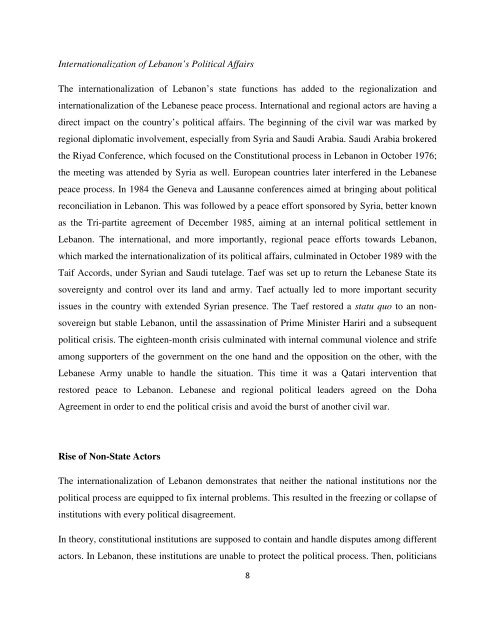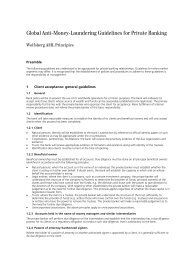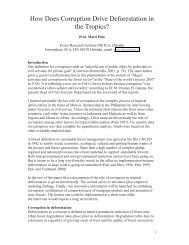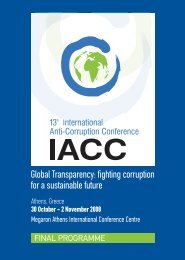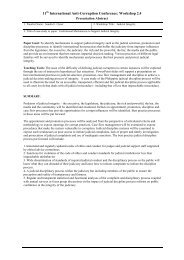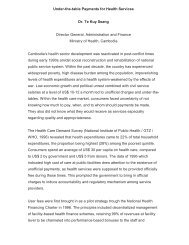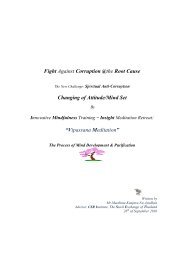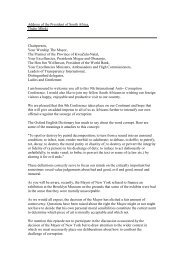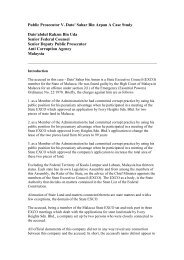The Role of Non-State Actors in Lebanon - International Anti ...
The Role of Non-State Actors in Lebanon - International Anti ...
The Role of Non-State Actors in Lebanon - International Anti ...
You also want an ePaper? Increase the reach of your titles
YUMPU automatically turns print PDFs into web optimized ePapers that Google loves.
<strong>International</strong>ization <strong>of</strong> <strong>Lebanon</strong>’s Political Affairs<strong>The</strong> <strong>in</strong>ternationalization <strong>of</strong> <strong>Lebanon</strong>’s state functions has added to the regionalization and<strong>in</strong>ternationalization <strong>of</strong> the Lebanese peace process. <strong>International</strong> and regional actors are hav<strong>in</strong>g adirect impact on the country’s political affairs. <strong>The</strong> beg<strong>in</strong>n<strong>in</strong>g <strong>of</strong> the civil war was marked byregional diplomatic <strong>in</strong>volvement, especially from Syria and Saudi Arabia. Saudi Arabia brokeredthe Riyad Conference, which focused on the Constitutional process <strong>in</strong> <strong>Lebanon</strong> <strong>in</strong> October 1976;the meet<strong>in</strong>g was attended by Syria as well. European countries later <strong>in</strong>terfered <strong>in</strong> the Lebanesepeace process. In 1984 the Geneva and Lausanne conferences aimed at br<strong>in</strong>g<strong>in</strong>g about politicalreconciliation <strong>in</strong> <strong>Lebanon</strong>. This was followed by a peace effort sponsored by Syria, better knownas the Tri-partite agreement <strong>of</strong> December 1985, aim<strong>in</strong>g at an <strong>in</strong>ternal political settlement <strong>in</strong><strong>Lebanon</strong>. <strong>The</strong> <strong>in</strong>ternational, and more importantly, regional peace efforts towards <strong>Lebanon</strong>,which marked the <strong>in</strong>ternationalization <strong>of</strong> its political affairs, culm<strong>in</strong>ated <strong>in</strong> October 1989 with theTaif Accords, under Syrian and Saudi tutelage. Taef was set up to return the Lebanese <strong>State</strong> itssovereignty and control over its land and army. Taef actually led to more important securityissues <strong>in</strong> the country with extended Syrian presence. <strong>The</strong> Taef restored a statu quo to an nonsovereignbut stable <strong>Lebanon</strong>, until the assass<strong>in</strong>ation <strong>of</strong> Prime M<strong>in</strong>ister Hariri and a subsequentpolitical crisis. <strong>The</strong> eighteen-month crisis culm<strong>in</strong>ated with <strong>in</strong>ternal communal violence and strifeamong supporters <strong>of</strong> the government on the one hand and the opposition on the other, with theLebanese Army unable to handle the situation. This time it was a Qatari <strong>in</strong>tervention thatrestored peace to <strong>Lebanon</strong>. Lebanese and regional political leaders agreed on the DohaAgreement <strong>in</strong> order to end the political crisis and avoid the burst <strong>of</strong> another civil war.Rise <strong>of</strong> <strong>Non</strong>-<strong>State</strong> <strong>Actors</strong><strong>The</strong> <strong>in</strong>ternationalization <strong>of</strong> <strong>Lebanon</strong> demonstrates that neither the national <strong>in</strong>stitutions nor thepolitical process are equipped to fix <strong>in</strong>ternal problems. This resulted <strong>in</strong> the freez<strong>in</strong>g or collapse <strong>of</strong><strong>in</strong>stitutions with every political disagreement.In theory, constitutional <strong>in</strong>stitutions are supposed to conta<strong>in</strong> and handle disputes among differentactors. In <strong>Lebanon</strong>, these <strong>in</strong>stitutions are unable to protect the political process. <strong>The</strong>n, politicians8


